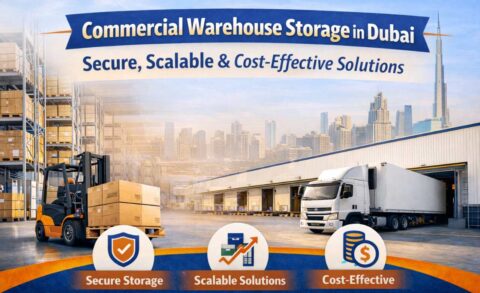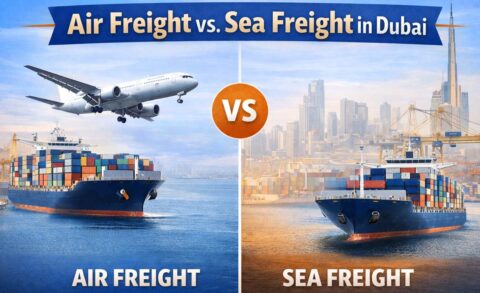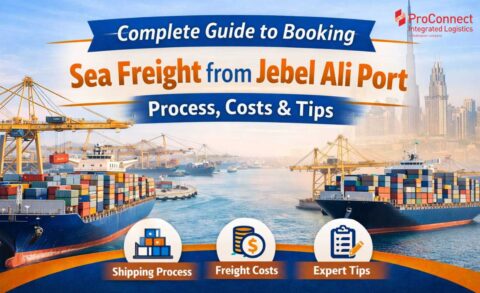Moving temperature sensitive goods depends on steady coordination between farms, factories, warehouses and transport teams. Items like fresh produce, dairy goods, meat, seafood, vaccines and similar sensitive materials need a controlled environment from the moment they leave the source until they reach the final point of use.
Cold Chain Logistics in UAE provides that controlled path. It uses dedicated infrastructure, specialised equipment, and consistent monitoring to keep products safe, stable, and ready for consumption, even when they travel long distances or pass through warm climates. Much of this work happens during short handling windows where products are most exposed to heat.
What Is Cold Chain Logistics? (Definition and Purpose)
Cold chain logistics is the controlled movement and storage of goods that must stay within a set temperature range to remain safe and usable. It supports products such as fruits, dairy, frozen food, vaccines, and pharmaceutical materials that can lose quality if they are exposed to heat or temperature shifts.
A reliable cold chain relies on calibrated cold rooms, temperature logged storage, insulated packaging and reefer units that maintain stable conditions throughout the journey. Even brief exposure at loading bays or during transfers can affect stability. In the UAE, where heat places extra pressure on sensitive cargo. This makes a stable cold chain logistics process especially important in the UAE, where outdoor heat can raise risks during short handling steps.

Why Cold Chain Logistics Matters for Perishables
Many perishable goods react quickly to warm conditions, so they need a controlled environment from the moment they leave the source This applies to everyday items such as fresh produce, dairy goods and pharmaceutical materials that depend on steady temperatures to stay safe and usable.
| Key Focus Area | Why It Matters |
|---|---|
| Protecting Product Integrity and Shelf Life | Stable temperatures help preserve freshness in food products and maintain the effectiveness of pharmaceutical materials. Even a brief temperature shift can speed up spoilage or reduce product stability. |
| Ensuring Compliance and Quality Standards | Many industries follow strict handling requirements to protect consumer safety. A well-managed cold chain keeps goods within the approved temperature range and supports overall quality expectations. |
| Minimising Waste, Spoilage and Financial Losses | Consistent cold chain logistics reduces the risk of damaged cargo, unnecessary waste and product returns. Preventing temperature excursions helps companies maintain higher quality levels and protect inventory value. |
Key Components of an Effective Cold Chain
An effective cold chain logistics depends on controlled storage, careful handling and equipment that keeps temperatures steady from stage to stage to keep temperature sensitive goods safe throughout their journey. Each part must work as one continuous system to avoid sudden temperature changes in protecting product quality and reducing the risk of spoilage.
Temperature Controlled Storage
Cold rooms and refrigerated warehouses keep products within the required temperature range before and after transport. These sites use calibrated cooling systems and monitored humidity to keep conditions stable.
Packaging and Insulation
Insulated packaging supports temperature control during handling and transit Proper insulation slows heat transfer during short handling periods, especially when products move between indoor and outdoor points when goods move between different stages of the supply chain.
Specialized Transport
Reefer trucks and refrigerated containers carry sensitive cargo while maintaining steady temperatures. Reliable transport is essential for preventing exposure to heat, especially on longer routes or during warm weather.
Cold Chain Logistics in the UAE: Unique Market Requirements
Managing cold chain logistics in UAE, Saudi Arabia & Qatar needs tighter control because goods often move through warm outdoor areas during loading and transit. Sensitive products can be exposed to warm conditions during loading, unloading or transit, so consistent temperature control becomes even more important. Reliable storage facilities, quick handling routines, and dependable reefer transport help reduce the risk of exposure during these steps.
High Temperature Environment and Seasonal Variation
The UAE experiences intense heat for much of the year. Careful timing is needed when goods move between indoor and outdoor points, since short exposure at loading bays can cause temperature changes.
Regulatory and Quality Standards in the UAE
Food, pharmaceutical and healthcare products must meet strict handling requirements. A well-managed cold chain supports compliance by keeping products within the approved temperature range from origin to destination.
Role of Free Zones in Cold Chain Efficiency
Free zones such as JAFZA and DWC offer strategic access to ports, airports and major distribution routes. These zones allow faster movement between sea, air and road networks, which helps reduce waiting times for temperature sensitive cargo.
Common Challenges in Cold Chain Logistics
Cold chain logistics involves managing products that react quickly to heat or delays. Short periods of exposure during handling or transit can quickly impact product stability. The challenges below are among the most common across temperature sensitive supply chains.
Temperature Excursions and Equipment Reliability
- Cooling systems can face strain during long routes or warm conditions
- Sudden equipment failures increase the risk of product damage
- Humidity and door openings can also affect conditions inside storage or vehicle units
Handling Delays and Transit Risks
- Delays during loading or unloading expose goods to warm environments
- Traffic, waiting times or extended border procedures can affect stability
- Coordinated scheduling helps reduce unnecessary waiting times
Industries That Depend on Cold Chain Logistics
Several industries depend on cold chain logistics because their products react quickly to warm conditions or extended handling times. These goods require controlled storage, careful timing and trained teams to keep conditions stable, making a controlled supply chain essential for consistent performance.
Food and Beverage Including Fruits, Vegetables, Proteins and Dairy
Food products react quickly to heat and require steady temperatures from harvest to retail. Items often pass through multiple handling points, so temperature consistency helps preserve natural freshness.
Pharmaceuticals and Healthcare Including Vaccines, Biologics and Diagnostics
Medicines, vaccines and laboratory materials require precise temperature conditions to preserve their effectiveness. Consistent temperatures support stability, and many of these products require documented handling steps throughout their journey.
Chemicals, Cosmetics and Specialty Goods
Some formulations can change consistency or separate when exposed to heat, so steady conditions help keep them usable. A reliable cold chain reduces the risk of product degradation and supports compliance with industry handling standards.
How ProConnect Supports Cold Chain Logistics in UAE
ProConnect supports cold chain logistics by using controlled storage environments, trained handling teams and transport that keeps conditions steady from site to site. Our teams follow documented steps for receiving, storing, loading and checking products so goods remain within their required temperature range. Each service is designed to maintain product integrity while meeting the expectations of businesses that handle food, pharmaceutical and specialty materials.
Temperature Controlled Warehousing Across the UAE, Saudi Arabia & Qatar
We operate temperature-controlled storage environments that support chilled, frozen and deep-frozen requirements. These storage areas use calibrated cooling systems and temperature logs reviewed at regular intervals.
Reefer Trucks and Multimodal Transport Capabilities
Our transport network includes reefer trucks and access to air and ocean freight options. Loading is planned to limit time spent at bay areas, and reefer units maintain consistent airflow during longer routes.
Real Time Visibility and Monitoring Technologies
Shipments can be monitored through temperature tracking tools that provide visibility into product conditions throughout the journey. This supports early action when required.
Dedicated Compliance and Quality Assurance Teams
Trained teams follow clear handling procedures to support consistent quality. These teams review temperature logs, verify handling steps and support internal checks to confirm product quality.
FAQs For Cold Chain Logistics in UAE
What is cold chain logistics?
Cold chain logistics is the process of keeping temperature sensitive products within their required range during storage, handling and transport. It keeps items such as food, vaccines and pharmaceuticals within a set temperature range to protect their safety and quality.
How does temperature monitoring work in a cold chain?
Sensors and data loggers record temperature readings at regular intervals throughout storage and transport. These readings help teams confirm conditions stayed within range and act quickly if temperatures begin to shift.
What products need cold chain support?
Items that react quickly to heat, including fresh produce, dairy, meat, seafood, vaccines, biologics, and certain chemicals, all depend on a stable cold chain.





 APP DOWNLOAD
APP DOWNLOAD